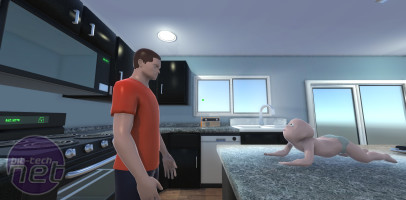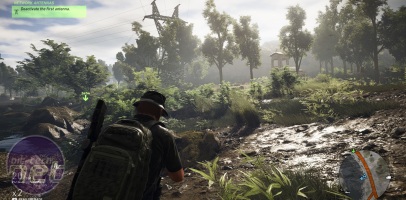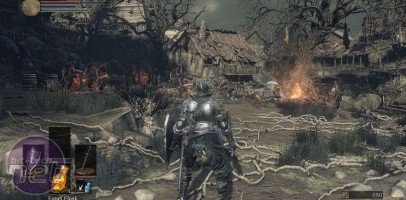How parenthood has altered my view of gaming
May 5, 2017 | 14:07


As some of you may know, I became a father for the first time just under a year ago. At the time I was concerned with a lot of different things. Would I be a good dad? How much was my life going to change? Could I cope with things like sleep deprivation, an inconsolable baby, and cleaning up nappies that resemble the Tough Mudder racecourse?
[break]
But perhaps my biggest concern was, would I still be able to do my job? I love working for bit-tech and as a games journalist in general, criticising new games, interviewing developers, trying to conjure up daft, overlong similes like a comedian in a joke contest with the Grim Reaper. But games writing is extremely time-intensive, and while I was earning enough to support myself, providing for a family was another matter.
Almost a year in, and so far everything is going well. I haven’t accidentally dropped or swallowed the baby. We’re not homeless or destitute, and I’m not falling asleep at my keyboard in the afternoons. If anything, it’s made me better at my job than I was before (your view may differ, of course). I’m more efficient and driven than I was before.
Yet while I’m managing to balance family life with work, some things have certainly changed regarding how I view, play, and enjoy games. Some of these I anticipated, but others have surprised me, and I thought I’d take the opportunity to share them with you, and see if any of you feel the same or differently.

The most obvious factor in my consumption of games these days is time. Whereas before I could structure my job more or less how I pleased, now I have to work according to a much stricter schedule. Before my daughter was born, I worried about how I’d balance family life with reviewing games, because a lot of modern games are very long. In fact, any game that has a running time of under eight hours is considered short. If you think about it, that’s the equivalent of a full day’s work. A forty hour RPG can take up to a week to review, and these days it’s entirely possible for several of those to be released a month, alongside dozens, perhaps hundreds of other games.
I’m not complaining, I love playing open-world games and big, absorbing RPGs. I’m just pointing out the reality of how long it takes to review them. Luckily, as it turns out, game length isn’t as much of a problem as I feared it would be. I have to be selective about which games I review to some extent, but I can find ways to squeeze the hours in if I need to.

What I don’t have time for these days is filler. Cookie-cutter content, repetitive side missions, fetch-three-things quests, collectibles, all that stuff I ignore. Strangely, I’ve found this to be a liberating experience. It makes RPGs and open-world games a lot pacier, as you’re only focussing on the stuff that’s important rather than helping every other random civilian find their missing dog.
Consequently, I feel much more like a hero, and not a weaponised handyman. It also helps me to judge how well-made an RPG or an open-world game is, because if I find myself being drawn away from the main quest by interesting side-missions or entertaining systems, I know the game is doing something right.
So size isn’t too much of a problem, because I can mitigate it in various ways. By comparison, I really struggle with getting stuck because of difficulty. It’s one thing to waste time doing samey tasks, quite another to waste it doing exactly the same thing over and over for the sake of some arbitrary challenge. I play games to explore their worlds and enjoy their systems, not to be tested within an inch of a breakdown. Real life is challenging enough right now, and I don’t need games adding to that. This doesn’t mean I will automatically dismiss a game because it is hard, but it really needs to justify that difficulty to hold my attention. Dark Souls I’d play because it is all about learning and discovery. But something like Darkest Dungeon, which is two parts punishment to one part luck? No thanks.

If I do fancy something a bit more testing, I’ll seek it out in multiplayer. Not only is playing against humans more enjoyably challenging than an AI, multiplayer games are also much better at compartmentalising that challenge into a smaller timeframe. If you’re killed in a multiplayer match, you’re usually back in the action within seconds, and that life offers a clean slate, an entirely different sequence of events. Even if you lose the match, often you’re provided with some small reward regardless. On the other hand, being killed in a single-player FPS or a rogue-like is obstructive to progress and can be quite costly.
In fact, I generally play more multiplayer games for recreation nowadays. Previously, I was never much of a multiplayer person, but it’s quick and convenient and easy to fit in. Oddly, though, the situation is reversed with cooperative games. When I was a student, my favourite game was Left4Dead. I played hours upon hours of it with friends both online and offline. Now, though, finding three other friends to play with requires a week’s prior notification, and even then there’s a chance that unanticipated baby-related duties will suddenly come calling.

Speaking of which, one pet-hate I’ve gained since becoming a dad is for games that don’t cater for the fact that you might suddenly have to depart them. I frequently see players complaining that they can’t skip cutscenes in certain games, but I would like more games to let me to pause them. This goes double for games with interactive dialogue like Mass Effect. When I reviewed Andromeda, several times I had to leave to answer the door or deal with a baby thing, and I’d come back to find a choice staring me in the face, with no context for what was said leading up to it.
One final note on the subject of convenience. Every game should support a 'Save and Quit' function. Every single one. If you’re game is a rogue-like or structured around permadeath, fine. But I shouldn’t have to restart the whole damned thing because I feel tired or need to do something else. It’s also useful to have a game automatically save when you quit it, because there’s always a chance I might forget, especially when I haven’t had a proper night’s sleep for days or weeks on end.
That’s more or less how my priorities have shifted in the last ten months. I don’t have time for games that ply me with superfluous filler, but I have lots of time for games that let me cease playing them without having to answer three riddles. Now I’d like to open the floor to you. If you’re a parent or guardian or owner of a particularly needy dog, how has that changed the way you view or play games? Leave an answer in the comments (provided you have the time).

MSI MPG Velox 100R Chassis Review
October 14 2021 | 15:04






Want to comment? Please log in.